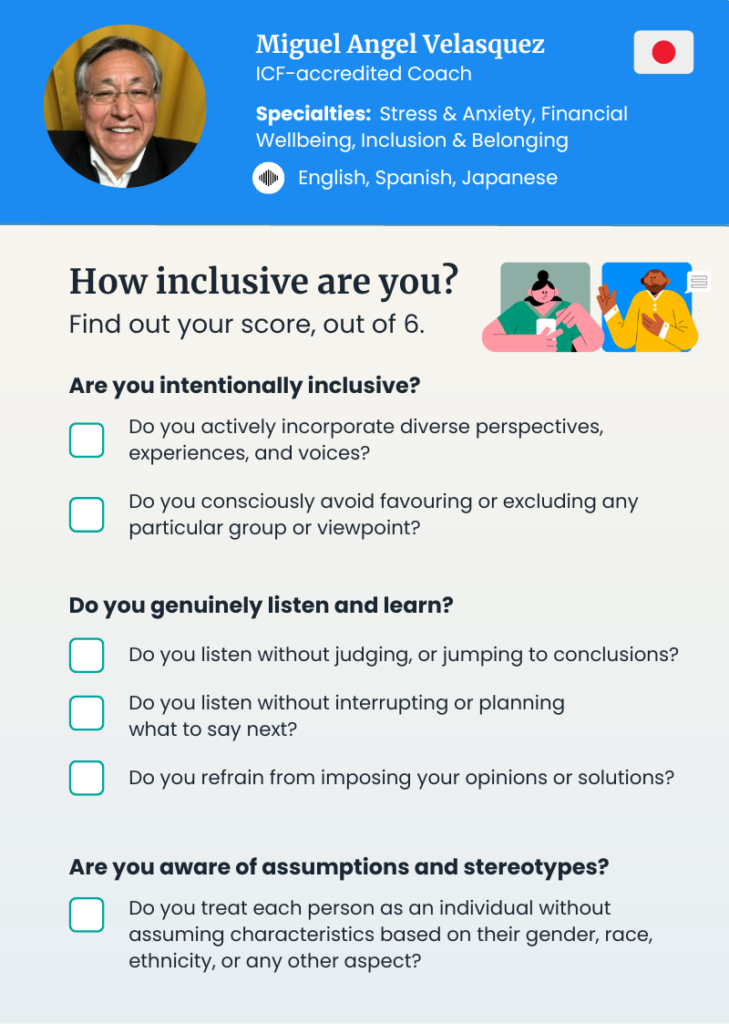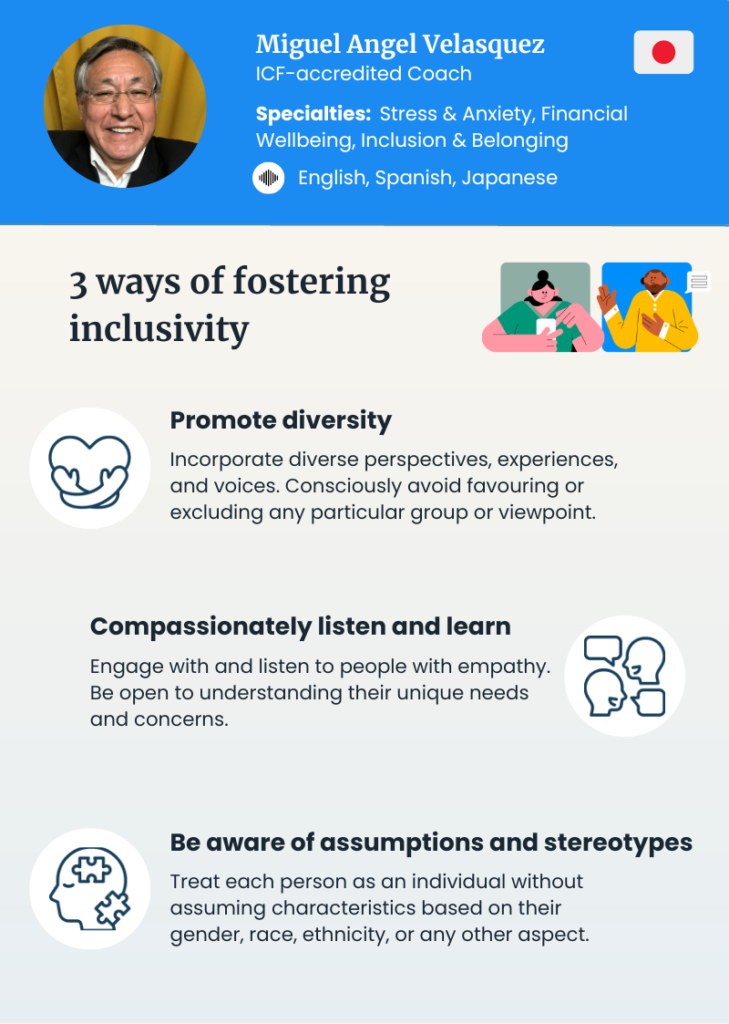Awareness of the “big three” – diversity, equity, and inclusion (DEI) – is pivotal for managers who aim to instil a progressive culture within their teams.
According to Intellect’s behavioural health coach, Miguel Velasquez, said in our DEI webinar that a sense of belonging improves employee mental health, making them more inclined to utilise the wellbeing program within their organisation.
Having worked in companies with diverse corporate cultures in South America, the US, and Japan, Miguel now partners with executive leaders to facilitate multicultural team building and team coaching. Drawing from his expertise, we have developed a simple quiz for managers who would like to check in on themselves and their level of inclusivity towards their teams.


How DEI-aware are you?
1. Do you incorporate diverse perspectives, experiences, and voices?
Consider a scenario where you are designing a new office space for the organisation.
What better way to create an inclusive work environment than by getting employees to participate?
You may leverage employee listening through consultations and surveys and co-create an optimal office layout that fosters growth, learning, and productivity. As employees thrive in various work settings, individuals who are more introverted may benefit from options such as private pods, telephone booths, and quiet zones, on top of the usual group meeting and conference rooms.
Workspace aside, you’ll also do well to consider the unique requirements of diverse employee groups. For instance, providing a dedicated breastfeeding room supports new mothers, enabling them to balance work and personal responsibilities comfortably. Additionally, offering prayer rooms acknowledges and respects employees of varying religious backgrounds.

2. Do you refrain from making assumptions based on single aspects of a team member’s identity (e.g. gender, age, orientation, ethnicity)?
Now, imagine that you are interviewing a female candidate for a role in a male-dominated industry.
How can you ensure a level playing field for all candidates? This is where things get tricky. Whether we are aware of it or not, we may inadvertently project unconscious biases that manifest as targeted questions. Some examples of such questions could include:
- “Do you plan on having kids in the future?”
- “How do you plan to balance your time with your family?”
- “Can you handle working in a male-dominated environment?”
- “Can you share an example where you proved yourself in one?”
Not only do these questions make a candidate feel undermined, but they can also influence the evaluation process and potentially lead to missing out on a perfectly good candidate. Instead, focus on assessing the candidate’s professional skill set and suitability for the role.
3. Do you avoid favouring or excluding any group in particular?
Say, you’re planning a team-bonding activity.
You may want to mull over the:
Gathering format: Consider the work setup of your organisation and determine whether a virtual, hybrid, or onsite gathering would allow all employees to actively participate, irrespective of their age, gender, orientation, or rank.
Accessibility of technology: When organising virtual or hybrid events, be mindful that some older employees may be less inclined to engage with complex online applications. Opt for user-friendly platforms and provide support for those who may need assistance.
Regional differences: Acknowledge that employees based in different regions may have varying public holidays or cultural observances. Consider these variations when scheduling team cohesion activities to ensure maximum attendance and engagement.
To ensure you’ve covered all bases, you could even assemble a diverse planning team that comprises individuals from various teams, representing diverse orientations, ages, genders, ranks, and ethnicities. Or, cover your blind spots by soliciting feedback from participants to identify potential areas for improvement in terms of inclusivity.

4. Do you listen without interrupting or planning what to say next?
Take, for instance, that a team member confides in you about feeling excluded when coworkers converse in Mandarin at work.
In such situations, listening becomes a powerful and often underestimated communication tool. Allow your coworker to express their feelings without interrupting or imposing your opinion. Avoid dismissing their emotions with phrases like “I’m sure they don’t mean to exclude you” or “Maybe you’re being sensitive”.
To demonstrate support, you may ask how they envision a comfortable resolution. What’s a possible course of action that would address the issue? However, it’s important to be cautious not to rush into finding a fix. Sometimes, the coworker might simply want to be heard and understood.
If the situation warrants it, consider speaking with the other coworkers involved to understand their viewpoint on the matter. However, always prioritise respecting your coworker’s trust and maintain confidentiality regarding their confided feelings.
5. Do you listen without judging or jumping to conclusions?
How would you respond if a team member told you they’ve just been diagnosed with ADHD?
Most of us may fumble, but you can’t go wrong with expressing gratitude and thanking your coworker for trusting you. It takes courage to open up and share, so listen intently to what they have to say.
IIn this age of information (and misinformation), we may be tempted to rely on our armchair knowledge of various health conditions, but that may not always be constructive. Instead, treat your coworker as an individual and approach their ADHD diagnosis with curiosity.
Which type of ADHD do they have? What symptoms do they experience? Are there any work-related concerns that require urgent attention or action? Some working adults with ADHD may express that they benefit from having structure, routines, and specific deadlines to thrive at work.
While navigating this conversation, be mindful of the different stereotypes surrounding ADHD and avoid using stigmatising language. Encourage them to seek professional help if necessary and offer resources, especially if their company is not part of an Employee Assistance Program (EAP).
6. Do you refrain from imposing your opinions or solutions?
Suppose a new mom in your team tells you she’s burnt out, and as someone who isn’t a parent yourself, you’re unsure about how to respond.

Well, a good way to start is by actively listening to what she has to say. While you may not fully understand what she is feeling, you can still offer empathy. Avoid giving unsolicited advice, but if she asks for guidance, be ready to provide it in a non-judgmental manner.
You might say something like, “How can I be of support to you at this time?” This approach allows her to express her needs without feeling overwhelmed or pressured.
To further support her, and if your role allows it, involve HR and assess the policies in place for different groups, including mothers. Evaluate whether the existing policies, such as work-from-home flexibility, extended maternity leave, paternal leave, breastfeeding room, and resources for new moms, are relevant and fitting to meet her current needs.
Did you get a 6 out of 6?
If you didn’t, fret not. Sometimes, our best intentions may not translate into the most ideal outcomes. The first step is becoming aware of the unconscious biases we hold.
Coaching offers a safe space to unlearn these unhelpful beliefs. Intellect’s diverse panel of ICF-accredited coaches not only help managers create positive team cultures and build psychological safety, but they also work with executives to implement systemic changes in the form of DEI-aware (Diversity, Equity, and Inclusion) company policies.
Learn more about Intellect for businesses here.








